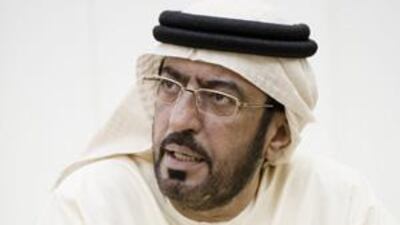ABU DHABI // It is just before midday and Mohamed Najeeb, the head of Abu Dhabi TV sports channels, arrives at his office following a meeting with the Barcelona chairman Joan Laporta. They have been discussing whether the big names of the world's most successful club team will be able to attend tonight's Super Awards where the region's best footballers will be recognised and at which one of Barcelona's superstars is thought to have won the world's best player prize.
But despite mixing in such powerful circles, what the veteran broadcaster is most concerned about is whether holding a showcase Fifa event in the UAE's capital will transform local football into something the country can truly be proud of. "I am sure when the Club World Cup final takes place on Saturday, Zayed Sports City will be filled to its capacity," said Najeeb. "The demand and love for football is here, but the standard of the local league needs to improve. That is the only way the fans will come."
"The attention that the tournament has brought is great. We know these type of events can help develop the game here because we have history of doing it. We have hosted the Asian Cup and the Under 20 World Cup, which we are now hoping to organise here again. "This region needs events like that and the supporters they bring. I just came from Barcelona's hotel and there are supporters sleeping outside just to catch a glimpse of the players. It's incredible.
"But it is not good if we don't use the Club World Cup in a positive way for the sport in general - the organisers of the league and the national team need to do this." The Emirates' domestic Pro League turned professional last season, but has continued to struggle in its attempts to attract supporters. Matches are televised live and match-day tickets are free, yet average attendances at the top teams' stadiums are in the region of 5,000.
In contrast, Tuesday night's match between Estudiantes of Argentina and Pohang Steelers of South Korea at the Mohammed bin Zayed Stadium attracted more than 22,000 spectators. "The population of this country is not so large, so why do the [Pro League] games take place at the same time?" said Najeeb. "If there are simultaneous games in Al Ain and Al Wahda how do they expect to fill the grounds? It's not feasible. "
The Emirati watched his country reach the World Cup finals in 1990, their first and only successful qualification campaign. And he conceded the country has gone backwards in recent years. Al Ahli's first-round defeat by the New Zealand amateurs Auckland City in the Club World Cup last week was "expected" he added. "We talk about professionalism, but the teams here are not professional. Yes, the players sign contracts for money, but they have the wrong mentality. You see the players late at night sitting smoking shisha and eating junk food. To become professional, we have to develop the younger players - the under 17s, the under 20s - and instil a sense of professionalism into them.
"Also, the teams need stability. We spend lots of money on foreign players, but they are not good enough and the players are chosen by the chairmen. "With all due respect, they should not be picking the squad. That is the manager's job and that is why the league is failing." Najeeb, who has been commentating on Arab football since his first job in 1978, rates the Saudi Professional League as the Middle East's strongest, with Qatar and the UAE - "similar in quality" - paling in comparison.
When asked about the Qatar's 2022 World Cup bid, he is not hopeful but recognises the tiny Gulf nation is making a big effort. "I wish them good luck," he said. "They will be able to organise it because they have excellent infrastructure, but the weather and the size of the country are both major factors that they will have to overcome. "I do not want to say it is impossible, but is will be very, very difficult.
Tonight's Super Awards are being held in a new studio at Abu Dhabi TV, and will be broadcast in both English and Arabic, with the programme lasting two hours. "We decided that with the Club World Cup being held here, we should show our appreciation to the best footballers from this region and recognise the fact that the leagues have transformed to a professional status," said Najeeb. "We want to be the best at whatever we do, so as well as welcoming several major names from this region, we will also host several high-profile international figures, such as Sepp Blatter, Demetrio Albertini and one very special surprise guest.
"During the show, we will honour the best players from the leagues of Egypt, Saudi, Qatar and the UAE, as well as revealing who the public voted as the region's most popular player. This will bring awareness and attention to local football." gmeenaghan@thenational.ae Abu Dhabi Sports 1 & 2, 6pm

